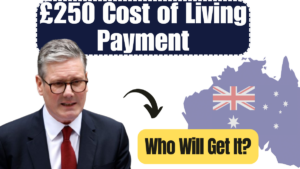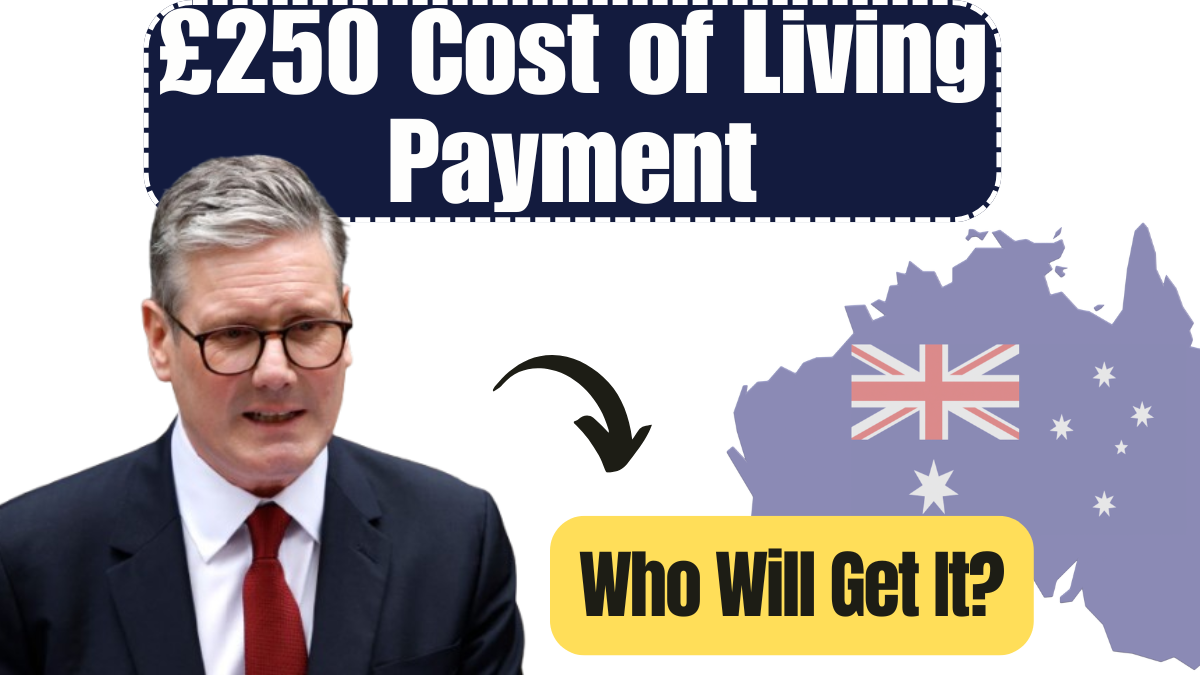In April 2025, the UK Government is rolling out a £250 Cost of Living Payment to support low-income households, pensioners, and individuals on disability benefits. This one-time, tax-free payment is designed to provide immediate financial relief amid ongoing challenges with inflation, energy bills, and rising food prices.
The Department for Work and Pensions (DWP) and HM Revenue and Customs (HMRC) will issue the payments automatically between 8 April and 28 April 2025 to eligible recipients. If you receive any qualifying benefits during the specified window, you’ll want to monitor your account for this extra boost.

Why Is the Cost of Living Payment Important?
With UK inflation still affecting daily expenses, the £250 support payment aims to reduce financial strain on vulnerable households. The rising costs of groceries, heating, and rent have hit families particularly hard, especially those with fixed or limited incomes.
The Office for National Statistics (ONS) reported that inflation averaged 6.8% in 2024, with food inflation crossing 10% at times. These government-funded direct deposits are meant to fill gaps left by traditional support mechanisms and help people avoid debt, health impacts, or housing instability.
Key Details About the £250 Payment
-
Amount: £250 (tax-free, one-time payment)
-
Distribution Window: 8 April – 28 April 2025
-
How You’ll Be Paid: Direct deposit into the same account where you receive benefits
-
No Application Required: Payments are made automatically
-
Bank Reference: Will appear as “DWP COL” or “HMRC COLP”
READ MORE: DoorDash to Pay Settlement in 2025 – How to Claim Your Share?
Who Is Eligible for the £250 Cost of Living Payment in April?
Eligibility is based on whether you were receiving certain government benefits during the qualifying window of 15 January to 28 February 2025. You will qualify if you were receiving one or more of the following benefits:
Income-Related Benefits:
-
Universal Credit
-
Pension Credit
-
Income Support
-
Income-based Jobseeker’s Allowance (JSA)
-
Income-related Employment and Support Allowance (ESA)
Tax Credits:
-
Working Tax Credit
-
Child Tax Credit
Disability Benefits:
-
Personal Independence Payment (PIP)
-
Disability Living Allowance (DLA)
-
Attendance Allowance
It’s important to note that contribution-based ESA or JSA do not qualify unless you also receive an income-related benefit.
This marks a positive expansion from previous cost-of-living payments, as disability benefit recipients are now included. This reflects the government’s recognition that individuals with disabilities often face higher essential living costs.
When and How Will You Receive the Payment?
Payment Timeline:
-
Begins: 8 April 2025
-
Ends: 28 April 2025
The payment will be automatically transferred into the same bank account where you currently receive benefits. No action or application is required.
Check your bank statement for the following identifiers:
-
“DWP COL” – if paid through the Department for Work and Pensions
-
“HMRC COLP” – if paid through HM Revenue and Customs
Payment dates may vary slightly by bank or depending on your benefit type.
What If You Don’t Receive the Payment?
If you believe you are eligible but don’t receive the payment by 1 May 2025, take the following steps:
-
Confirm Eligibility:
-
Log into your Universal Credit or HMRC account or refer to your benefit award letter from January–February 2025.
-
-
Check Bank Statements:
-
Search for deposits with references “DWP COL” or “HMRC COLP” between 8 and 28 April.
-
-
Update Your Information:
-
Ensure your banking and contact details are current with DWP or HMRC.
-
-
Contact DWP or HMRC:
-
If the payment hasn’t arrived by 1 May, reach out via the official gov.uk contact page for assistance.
-
Keep a record of your communications in case you need to follow up or escalate the matter.
How This Payment Supports UK Households
The April 2025 £250 cost of living payment is more than just a financial handout—it’s a critical support measure during one of the most challenging economic periods in recent memory. It serves to:
-
Reduce immediate financial stress
-
Help cover essentials like food, heating, rent, and transport
-
Bridge gaps for families and individuals with low or fixed incomes
-
Complement other national and local support schemes
By proactively checking your eligibility and staying informed, you can make sure you receive your rightful share and keep your household finances on track.
Click here to know more.
